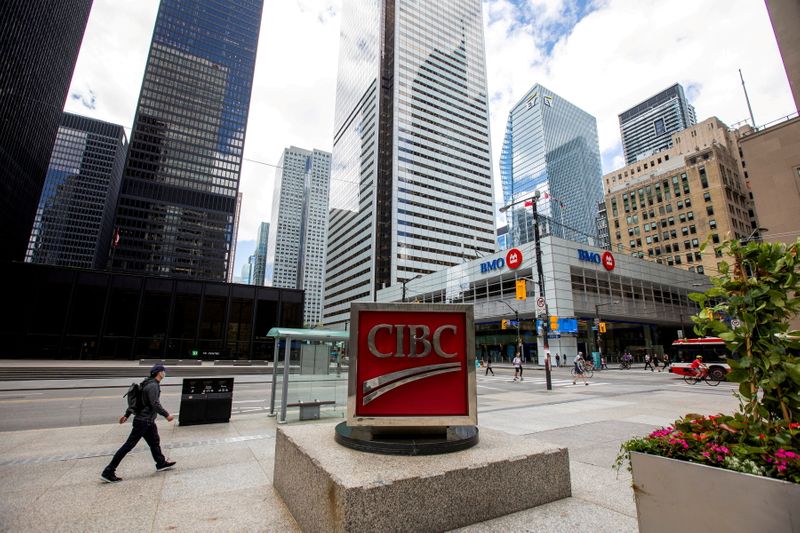By Nichola Saminather
TORONTO (Reuters) - Surging inflation and rising bond yields are set to offer a shot in the arm for Canadian banks' profit margins, which have languished during the pandemic, but an aggressive response by central banks could derail a nascent lending recovery and increase defaults, investors and analysts said.
Canadian banks' loan growth outside of mortgages all but disappeared during the pandemic as lockdowns and surging deposits slowed consumer and business borrowing. Although spending has increased after lockdowns were lifted, that has so far failed to translate into robust credit growth.
Higher interest rates drive banks' net interest margins. But uncertainty around how persistent inflation will be and how quickly rates will rise is clouding the outlook for lending recovery into next year that investors had hoped for.
"If (the Bank of Canada and U.S. Federal Reserve) raise rates too quickly, that would stifle economic growth, and loan demand will decline. ... That would be a negative for the banks and have a negative impact on profitability," said Rob Colangelo, vice president and senior credit officer at Moody's (NYSE:MCO) Investors Service.
An aggressive response would raise loan servicing costs, raising the potential for defaults. Banks would increase bad loan provisions, which would lead to weaker profit growth.
And given the recent surge in demand for variable-rate mortgages, a rapid rise in rates would make borrowers more vulnerable, potentially leading to loan losses, said Mike Driscoll, head of North American financial institutions at DBRS Morningstar.
The latest data showed inflation surged to a near two-decade high of 4.7% in October. While money markets expect a hike as soon as March and five in all next year, the Bank of Canada reiterated this week that increases are not expected until the middle quarters of 2022.
"Grocery prices, cars, everything that people buy is getting more expensive," Driscoll added. "While wages may be increasing, real wages are declining. Given the high debt loads ... that can be problematic. There could be higher credit losses."
As the pandemic recedes, investors are hoping banks' profit growth would once again come from core lending operations, rather than from releasing bad debt reserves that have driven better-than-expected earnings in the past year, and other businesses like wealth management and capital markets.
To be sure, most analysts and investors don't expect the central bank to raise rates so quickly and abruptly that it derails the economic recovery. But if the Bank of Canada delays hikes, and inflation persists and seeps into wages, it may not have a choice, some investors said.
"We assume that if inflation continues to be elevated well above the target range, (the central bank) could be forced to act," Colangelo said.

An overnight rate "pushing 3%" is the point that could choke off economic growth and possibly prompt a recession, said Brian Madden, portfolio manager at Goodreid Investment Counsel.
"A recession is unambiguously bad for the banks. ... You get credit losses, and it chokes off loan demand," he said. "I think it's unlikely, but the risk isn't zero."